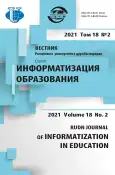Teaching students the equations of mathematical physics using educational electronic resources
- Authors: Rusinov A.S.1
-
Affiliations:
- Moscow Сity University
- Issue: Vol 18, No 2 (2021)
- Pages: 188-196
- Section: ELECTRONIC LEARNING SUPPORT TOOLS
- URL: https://journal-vniispk.ru/2312-8631/article/view/321232
- DOI: https://doi.org/10.22363/2312-8631-2021-18-2-188-196
- ID: 321232
Cite item
Full Text
Abstract
Problem and goal. Currently, information and telecommunications technologies are widely used in the professional activities of most specialists in various subject areas. This circumstance initiates the training of students in higher education institutions, who must have not only deep subject knowledge, but also be able to master modern information and telecommunications technologies and be able to apply them in their activities. One of the fundamental disciplines that is included in the university curricula for preparing students of physical and mathematical fields of study is “Equations of mathematical physics”. In the process of teaching students the equations of mathematical physics, the goals are set not only to form students' solid subject knowledge, but also to acquire the skills and abilities to apply modern information technologies in the study of mathematical models based on the equations of mathematical physics. Methodology. Educational electronic resources are used in training sessions on mathematical physics equations. Such training sessions with students take place in the form of laboratory classes, where modern computer technologies are used to find solutions to equations of mathematical physics and then analyze them. Results . The implementation of didactic principles of teaching mathematical physics equations in laboratory classes using educational electronic resources allows students to achieve good results in the methods of studying mathematical physics equations. Conclusion. The use of educational electronic resources in the classroom on the equations of mathematical physics allows students, in addition to deep subject knowledge, to acquire the skills and abilities to use modern computer techno- logies to solve mathematical problems.
About the authors
Alexey S. Rusinov
Moscow Сity University
Author for correspondence.
Email: aleksey@rusinov.name
postgraduate student, Department of Informatization of Education, Institute of Digital Education
29 Sheremetyevskaya St, Moscow, 127521, Russian FederationReferences
- Aramanovich IG, Levin VI. Equations of mathematical physics. Moscow: Nauka Publ.; 1969. (In Russ.)
- Arsenin VYa. Methods of mathematical physics and special functions. Moscow: Nauka Publ.; 1984. (In Russ.)
- Ashikhmin VN, Gitman MB, Keller IE, Naymark OB, Stolbov VYu, Trusov PV, Frik PG. Introduction to mathematical modeling: textbook. Moscow: Logos Publ.; 2004. (In Russ.)
- Blekhman IM, Myshkis AD, Panovko YaG. Applied mathematics: subject, logic, features of approaches. Moscow: KomKniga Publ.; 2005. (In Russ.)
- Vladimirov VS. Equations of mathematical physics. Moscow: Nauka Publ.; 1981. (In Russ.)
- Goloskokov DP. Equations of mathematical physics. Solving problems in the Maple system: textbook for universities. Saint Petersburg: Piter Publ.; 2004. (In Russ.)
- Kurant R. Partial differential equations. Moscow: Nauka Publ.; 1964. (In Russ.)
- Lavrentyev MM, Romanov VG, Shishatskiy SP. Ill-posed problems of mathematical physics and analysis. Moscow: Nauka Publ.; 1980. (In Russ.)
- Martinson LK, Malov YuI. Differential equations of mathematical physics. Moscow: MGPU imeni N.E. Baumana Publ.; 1996. (In Russ.)
- Petrov YuP, Sizikov VS. Correct, incorrect and intermediate tasks with applications: textbook. Saint Petersburg: Politekhnika Publ.; 2003. (In Russ.)
- Sobolev SL. Equations of mathematical physics. Moscow: Nauka Publ.; 1992. (In Russ.)
- Tikhonov AN, Samarskiy AA. Equations of mathematical physics. Moscow: Izd-vo MGU Publ.; 1999. (In Russ.)
- Rikhtmayer RD. Difference methods for solving boundary value problems. Moscow: IL Publ.; 1960. (In Russ.)
- Federal state educational standards of higher education of the Russian Federation. (In Russ.) Available from: https://fgos.ru/ (accessed: 22.11.2020).
- Bidaybekov EY, Kornilov VS, Kamalova GB. Teaching future teachers of mathematics and computer science inverse problems for differential equations. Bulletin of the Moscow City Pedagogical University. Series: Informatics and Informatization of Education. 2014;3(29):57-69. (In Russ.)
- Kornilov VS. Humanitarian component of applied mathematical educatio. Bulletin of the Moscow City Pedagogical University. Series: Informatics and Informatization of Education. 2006;2(7):94-99. (In Russ.)
- Kornilov VS. The role of computer science training courses in teaching university students numerical methods. Bulletin of Peoples’ Friendship University of Russia. Series: Informatization of Education. 2011;(3):24-27. (In Russ.)
- Kornilov VS. Inverse problems in educational disciplines of applied mathematics. Bulletin of the Moscow City Pedagogical University. Series: Informatics and Informatization of Education. 2014;1(27):60-68. (In Russ.)
- Kornilov VS. Teaching students inverse problems of mathematical physics as a factor in the formation of fundamental knowledge on integral equations. Bulletin of the Laboratory of Mathematical, Natural Science Education and Informatization: Peer-reviewed Collection of Scientific Papers (issue VI). Samara: Samarskiy filial MGPU Publ.; 2015. p. 251-257. (In Russ.)
- Kornilov VS. Implementation of the scientific and educational potential of teaching university students inverse problems for differential equations. Kazan Pedagogical Journal. 2016;(6):55-59. (In Russ.)
- Grinshkun VV. Existing approaches to the use of informatization tools in teaching natural science disciplines. Bulletin of the Moscow City Pedagogical University. Series: Informatics and Informatization of Education. 2014;4(30):8-13. (In Russ.)
- Belenkova IV. Methods of using mathematical packages in the professional training of university students (Dissertation of the Candidate of Pedagogical Sciences). Ekaterinburg; 2004. (In Russ.)
- Dakher EA. Mathematica System in the process of mathematical training of specialists in the economic profile (Dissertation of the Candidate of Pedagogical Sciences). Moscow; 2004. (In Russ.)
- Ragulina MI. Information technologies in mathematics. Moscow: Akademiya Publ.; 2008. (In Russ.)
- Tarasevich YuYu. Mathematical and computer modeling. Introductory course. Moscow: URSS Publ.; 2004. (In Russ.)
Supplementary files









